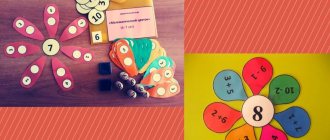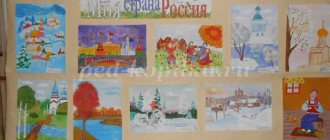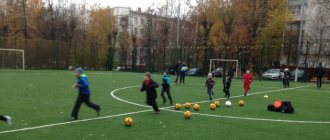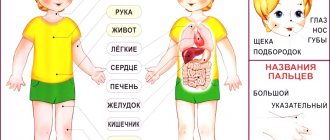Development and education of children from 2 to 11 years old in a playful way
Start practicing right now
Start practicing
Play, play, play... If you constantly hear this request from your child, then you are very lucky! It is through play that a child learns about the world, absorbs new information, gets acquainted with the surrounding reality and learns to interact with people. But in order for games not only to entertain, but also to provide benefits, it is important to make them educational. Such games allow the child to gain knowledge in an entertaining way, as well as acquire an important ability for self-learning. What educational games should you choose? Read about it in our article!
Games for kids
The little ones who are just discovering the world of educational games will definitely appreciate simple and entertaining tasks in which, with the help of bright and familiar pictures, they can learn the names of vegetables, learn to distinguish clothes and shoes by weather and seasons, as well as distinguish objects by size and find identical pictures. Make games with your kids even more interesting by connecting your favorite toy to this: you can consult with it, it can give hints, ask leading questions and sometimes even answer instead of the baby.
Children's games - Game with parents of the preparatory group “One Hundred to One”
Publication “Game with parents of the preparatory group “One Hundred to...” 1st round. A simple game Question - Theater begins with a hanger, but where does school begin? - from the lobby 10 - from the locker room 8 - from students 6 - from September 1 4 - from the briefcase 3 - from the run around 1 2nd round. Double game (points x 2) Question - Your child received a deuce. How will you welcome him home? -...
Image library "MAAM-pictures"
Using the game “Double” for the development of speech in preschoolers Speech is a great gift of nature, thanks to which people receive ample opportunities to communicate with each other. Full command of the native language in preschool childhood is a necessary condition for solving the problems of mental, aesthetic and moral education of children to the maximum...
Game-construction through speech development. Activities of the educator. Children's activities. Beginning of the game. Q: Guys, I have prepared an interesting poem for you. Listen to him “Wonderful money came out” Q: What is it about Q: Let’s name them. IN; Do you want to play a game in which these prepositions will be Children listen to a poem About...
Game “Hospital” average group 4–5 years Topic: “Hospital” Age: Average group 4-5 Program content: Educational: Develop in children the ability to independently develop the plot of the game “Hospital”; promote the independent creation and implementation of game plans; Educational task for children with disabilities:...
Children's games - Using Voskobovich games to develop mathematical abilities
Article "Use of Voskobovich's games for the development of mathematical..." Abstract-message on the methodology of using Voskobovich's educational games in the logical and mathematical education of preschool children. The accessibility and manufacturability of the material used in these games will allow the child, every time he interacts with the game, to discover its new and new facets...
Consultation for parents “Developing speech games for little ones” At about a year old, babies begin to become interested in the objects around them. Take advantage of this feature of a one-year-old child and offer him very real games. Today, the market for games for children is very diverse: a lot of different educational games are produced for kids...
Manual "Mirilka"
Work experience on the topic: “Development of speech of young children through small folklore forms.” Manual: Mirilka Goal: to develop in children the ability to establish and maintain contacts with peers using small folklore forms. Procedure: children place their hands on their palms and...
A selection of games for children of the younger group The game “We woke up.” The teacher reads a poem. Listening to the text, children complement the poem with gestures: “The sun came out for a walk, to play with us. Get ready, people, for our merry round dance! The sun has risen in the morning - it’s time for us to wake up. Stretch, hurry up...
Pages: … 3616
Games for girls
It is obvious that the interests of little princesses are focused on quiet games that introduce flowers and clothes, dishes and furniture, plants and animals. Educational games for girls will help you learn the colors and their names, sweets and special features of the holidays, and teach you how to assemble cute and kind puzzles with cartoon characters and heroes of your favorite cartoons. Some educational games have special themed printables for girls that you can play with offline or use to reinforce themes.
Are computer games useful?
In order to help the child develop, the parent must always be there. So you can’t just turn on your tablet or PC, sit your child in front of it and go about your business for hours. And in case of failure, always criticize the World Wide Web. No, things are a little different. It is important to choose the right games that will help you develop, and you should not forget about parental control so that your child does not accidentally see something forbidden.
Games for boys
Active educational games are what mischievous fidgets need. Study transport, improve your logical thinking, get acquainted with figures and various musical instruments, trying to find their analogues: for example, instead of a pipe, try blowing into an empty glass decanter or glass and compare the sounds. Be sure to take a break between exercises so that your child does not stay too long. To do this, set up a special rest window in your Personal Account, which will allow you to break up educational games with useful breaks - modeling, appliqué, exercises or finger gymnastics.
Educational games
This type of educational activity will appeal to children who love to slowly and thoughtfully study the world around them. For them, we have prepared tasks for finding patterns, attention and memory, observation and eye. Develop perseverance, intelligence and horizons with the help of online games about space, stars and planets, countries and continents, living and inanimate nature.
Logic games
Educational games aimed at teaching logical thinking teach children to analyze and compare different pictures, stimulate reasoning and look for patterns between objects and phenomena, as well as compare and build logical connections between apparently different objects. Logic problems and puzzles in the form of entertaining illustrations and animated tasks can captivate a child for a long time and instill in him a thirst for knowledge.
More games
The site has accumulated a large amount of material for the development of a child. We recommend watching:
- Educational games with Pop It.
- Games for developing a child's speech.
- Games for learning numbers in a fun way.
- Games for learning letters.
- Colorful math exercises for preschoolers.
- Logic games, toys, puzzles, tasks and books for children. A selection of the most exciting and useful things.
- Tangram games.
- Educational games for a two year old.
- Educational games for three year olds.
- Games for memory development.
- Games to develop imagination in children.
- Games for the development of visual perception.
- Fascinating and useful tasks for children 6 years old.
- Educational puzzles for children
- Subtraction examples with pictures for preschoolers.
- Printable mazes for children.
- What to do with your child at home: the best ideas.
- Print out interesting educational tasks for children.
- Print logic games for children for children 3-6 years old.
Coloring pages
Do you want to draw, but with benefit, and at the same time motivate to learn? Use our coloring pages! They are given as a reward for correct answers, and the stories in them help to get acquainted with new topics: children's holidays, seasons and situations familiar to the child, which can then be used to create a fairy tale. Collect coloring books from Ikyusha in a separate folder and turn them into a picture book.
Modern interactive educational games for preschoolers: games developed by specialists - speech therapists, teachers, psychologists - especially for children from 2 to 8 years old.
From today you can play these games directly on the “Native Path” website with your children.
You can find the games page here. And also on this page you will find a video about how to play these games with maximum benefit for a child’s development and how you can easily and simply create your own manuals for classes, themed games and weeks using a picture constructor.
The games were developed by Ekaterina Suslova and other authors - specialists (speech therapists, teachers, psychologists) of the Mercibo portal for teachers and parents. For every age of the baby you will find games that develop:
- speech, - memory, - attention, - thinking, - horizons, - reading skills, - counting skills, - creativity, - motor skills.
Who are these games for:
1. For parents of children from 2 to 7 years old. These games allow a preschooler to learn, develop, explore the world around him, improve his speech, become familiar with letters and numbers, and prepare for school in a way that is exciting for a preschooler. They bring pleasure to both adults and children! I will be glad if this page becomes one of your favorites and you often play on it with your kids :).
2. For specialists - kindergarten practitioners. studios, centers, school preparation groups, family clubs. On my site there are many regular readers - specialists - child psychologists, defectologists, educators, teachers of children's studios, centers and circles. There are also teachers who work with the most difficult children in boarding schools and orphanages, and who work with disabled children. I really hope that these games will help you make activities with children interesting for them, give them new creative ideas and also... help you prepare for activities with children quickly, easily and make colorful manuals for them in a few clicks of the mouse. For me, these games were a real find. I will be glad if you find a lot of valuable and interesting things in them, and your children will love them!
Why do I recommend these games to you?
There are a lot of online games, but basically these games do not meet the requirements for educational interactive games for children under seven years old; they are created without taking into account the psychology of the child and the patterns in the learning of children. These same games are that rare case when an online game truly develops and educates a child, instills good feelings in him, develops curiosity and brings joy to the family and good empathy of joy. It was among the streams of various proposals for cooperation that I singled out these games and I can recommend them to you! And I’m very glad that now I have the opportunity to make it so that you can play them right on the “Native Path”.
I wish everyone joyful and interesting games! See you again on the “Native Path”. The games block is here.
Get a NEW FREE AUDIO COURSE WITH GAME APPLICATION
“Speech development from 0 to 7 years: what is important to know and what to do. Cheat sheet for parents"
Click on the link or course cover below to subscribe for free
The author of the course is Valasina Asya, candidate of pedagogical sciences, author of the website “Native Path”
Puzzles
An educational game that can be played on any device, even without the Internet. Now you don’t need to take with you many boxes of puzzles and worry if some piece is lost. Just select and download a mosaic in our application to play offline, and then assemble the puzzle by completely disconnecting the Internet. We have mosaics with many details and subjects: animals, numbers, letters, furniture, plants, geography, family, etc.
Collection of educational games"Educational games for preschool children"
municipal budgetary educational institution of the city of Novosibirsk
"Secondary school No. 34"
630900, Novosibirsk, st. Novouralskaya 11/3
Tel.: (383)279 – 79 – 39, 282 – 13 – 35,
e - mail : mbou_sch
[ email protected ] mail . ru Collection of educational games for preschoolers
Compiled by:
Khromchenko V.V.
teacher of 1st qualification category
Novosibirsk 2021
Games are our children's favorite pastime. The game plays a huge role.
Educational games for preschool children are a means of understanding the world, a kind of guide to the world around them. With the help of educational games, he gets acquainted with color, shape, sound, etc., that is, he explores reality.
The types and properties of attention, memory, and imagination develop. By playing, kids help each other master certain physical, cognitive and social skills.
Through the game, his development, training and education occur, the moral and volitional qualities necessary for development are formed and is the leading type of activity.
There are several types of games and each type performs its own function in the development of a child.
Taken together, educational and educational games should contribute to the development of children’s thinking and memory. Attention, creative imagination, ability to analyze and synthesize, perceive spatial relationships, develop constructive skills.
Games for memory development.
Game “Remember the pictures”
Target:
develop visual memory.
Progress of the game:
The child is offered a picture, each depicting objects. The child must look at these objects for 2 minutes. Then remove the picture, and ask the child to name the objects that he managed to remember.
This game can be organized with several children. And in pairs. The guy who remembers the most items wins.
Game "What has changed?"
Target:
develop visual memory and attention.
Progress of the game:
Option 1.
Assignment: Ask your child to first look carefully at a picture of five familiar objects and name them.
Then close this picture, offer another one on the next page, and ask. Are there any objects in it that were in the first picture? What items are missing? What items have reappeared?
Option 2.
Assignment: ask your child to look carefully at the drawing that shows 5 objects. Then close the drawing and offer the child a new drawing, which already has 7 objects. Ask him if there are any objects here that were in the first picture? What items have reappeared?
Game “Which toy is missing?”
Target:
develop children's visual memory and attention.
Progress of the game:
Place 5 toys in front of the child for 15-20 seconds.
Then ask your child to turn away and remove one toy. Ask your child: “What toy is missing?”
Game “Describe the object and its image”
Target:
develop figurative voluntary memory.
Progress of the game:
The game is played with a group of children. Objects are given to the children. In this case, the objects must differ in shape. Each child must carefully examine his object, every detail of it. Ask the children to talk about their object, what it is like, what it looks like, even, if possible, give it a name. Give instructions to memorize your subject. Then the objects are collected, the child must find his object according to the description.
This game can be played with small pebbles.
Children who correctly found their objects should be recognized
Educational creative games
Game "Magic Chair"
Target:
teach children to think about how to implement this or that plan.
Progress of the game:
ask the children to stand in a circle, place some beautiful chair in the center. Children walk in a circle and sing:
Who is the most beautiful today? Who is the happiest person today? Show up quickly! Sit on the magic chair!
Children take turns sitting on a magic chair, and everyone in a circle must say something good and kind about the person sitting on the chair. Before starting the game, tell the children that the magic chair can give children good qualities and, on the contrary, takes away all the bad qualities from them. But to see this, you need to look with magic eyes at the one who is sitting on the magic chair.
Game "Only Good"
Target:
teach children to think and develop speech.
Progress of the game:
The teacher, with a ball in his hands, stands in front of the children, asks them to line up, and then throws the ball to each of them. Children catch the ball only when some good quality is pronounced (truthfulness, kindness, accuracy). In this case, they take a step towards the teacher. If children accidentally “catch a bad quality” (intolerance, greed, anger), they take a step back.
The one who reaches the teacher first wins. This person becomes the leader.
Game "Beauty Ring"
Progress of the game:
tell the children that you have a beauty ring. As soon as you point the ring at any person, all the most beautiful things in him immediately become visible. Children stand in a circle and extend their folded palms forward. The teacher discreetly places a ring in someone’s hands. Then the children shout in unison: “Ring, ring, go out onto the porch.” The person who receives the ring runs out to the middle of the circle. He should touch his friends with the ring and tell him what beautiful things he sees in them. The one who sees the most beauty in his friends receives a beauty ring as a gift.
Games for dexterity, speed, attention
Game "Sly Fox"
Target:
dexterity, speed, coordination, motor activity skills of children, attention.
Progress of the game:
The driver is selected, the children stand in a circle at a distance of one step from each other. The driver invites the players to close their eyes and, walking around the circle behind the children, I touch one of the players, who becomes the “Sly Fox.”
Then the children are invited to open their eyes and look carefully which of them is the sly fox, will she give herself away in some way? The guys ask three times in unison, first quietly, and then louder: “Sly fox, where are you?” The sly fox quickly goes to the middle of the circle, raises his hand up and says: “I’m here.” All the players scatter around the site, and the fox catches them. After the fox catches 2-3 people, the teacher says: “In a circle!” And you form a circle again, the game repeats.
Game "Owl on the hunt"
Target:
teach children to quickly act on a signal and navigate in space; develop dexterity, develop fine motor skills
Progress of the game:
the teacher will be the leader. Using a counting machine we select “owl”. Her nest is fenced off to the side with a gymnastic bench. Children are located randomly on the playground, and the owl is in the nest.
-At the presenter’s signal: “The day is coming, everything comes to life!” — children begin to run and jump. Imitating the flight of butterflies, birds, beetles. Depicting frogs, mice, kittens. At the second signal: “Night is coming, everything freezes - the owl flies out!” - the players stop, freeze in the position in which the signal caught them. "Owl" goes hunting. Noticing the player moving, she takes him by the hand and leads him to her nest. (In one exit she can kill two or even three players).
- Then the “owl” returns to her nest again, and the children again begin to frolic freely. Ready to play?
— Players who have never been caught win. (You can also note the best driver - the one who caught the most players)
-Well done, now let's rest a little.
In front of each of you is a plate containing beans and women. Let's try to sort through them. There is only one condition: you need to take one bean or one bean at a time.
Game "Master and Geese"
Target:
teach children to quickly act on a signal and navigate in space; develop dexterity.
Progress of the game:
At the beginning of the game, we use a gymnastic rope to fence off the “house” where the owner and the geese live.
On the other side of the site, a “field” is outlined - this is where the geese go for a walk. Between the “house” and the “field” a circle is drawn, a “den”. A wolf will live there . (Next, using a counting rhyme , a wolf is selected (if there are many guys, there may be several wolves) and the owner of the geese. The rest become geese)
(When playing with adults The role of the host is usually taken by an adult, who is also the host of the game).
The owner says to the geese:
- Geese, fly into the field, take a walk, don’t fall into the clutches of the wolf.
The guys run, waving their arms, into the “field”.
What follows is a dialogue between the owner and the geese:
- Geese, geese! - Ha-ga-ha! - Do you want something to eat? - Yes Yes Yes! - Well, fly home! “The gray wolf is under the mountain and won’t let us go home.” - What is he doing? - He sharpens his teeth and wants to eat us. - Well, fly as you want, just take care of your wings!
The geese spread their winged arms and fly home to the goose coop, and the wolf growls and tries to catch them. Caught
The geese are eliminated from the game and the game continues. The winners are those who have never fallen into the clutches of a wolf.
(A second version of the words is possible
- Geese, geese! - Ha-ga-ha! - Do you want something to eat? - Yes Yes Yes! - So fly home! — Gray wolf under the mountain. He won't let us go home! - Well, fly as you want, just take care of your paws!)
Story-based role-playing games
Game "Shop"
Target:
teach children to classify objects according to general characteristics, introduce the concepts of “toys”, “furniture”, “food”, “dishes”.
Progress of the game :
the teacher invites the children to place a huge supermarket in a convenient place with departments such as vegetable, grocery, dairy, bakery and others where customers will go.
Children independently distribute the roles of sellers, cashiers, sales workers in departments, sort goods into departments - groceries, fish, bakery products, meat, milk, household chemicals, etc. They come to the supermarket for shopping with their friends, choose a product, consult with sellers, pay at the cash register. During the game, the teacher needs to pay attention to the relationship between sellers and buyers. The older the children, the more departments and products there may be in the supermarket.
Game "Who builds a house"
Target:
introduce children to construction professions
Progress of the game:
The teacher invites the children to guess the riddle: “What kind of turret is there, and is there a light on in the window? We live in this tower, and it's called? (house)". The teacher invites the children to build a large, spacious house where toys can live. Children remember what construction professions there are, what people do at a construction site. They look at pictures of construction workers and talk about their responsibilities. Then the children agree to build a house. Roles are distributed among the children: some are Builders, they build a house; others are Drivers, they transport building materials to a construction site, one of the children is a Crane Operator. During construction, attention should be paid to the relationships between children. The house is ready and new residents can move in. Children play independently.
Puzzles
Something that all kids love! With and without rhyme, about animals and letters, about logic and intelligence - this is a favorite educational game for children of all ages. All our riddles not only entertain, but also educate and test knowledge. Each task has an illustration and explanation of the correct answer, so that the child learns to think and crack riddles like nuts.
Special studies were carried out, from which the following conclusions were made:
- a child who plays computer games becomes more attentive and focused in life, which helps in the future while studying - to listen and remember more information;
- various puzzles, quests and other tasks develop logic and the ability to multitask;
- fine motor skills return to normal thanks to working with the keyboard and manipulator;
- with each new level, the child learns to analyze its complexity, and then this will help to correctly assess his opportunities in life, which, in turn, will also help in self-development;
- to relieve some nervous tension, you can choose games with elements of restrained aggression, but parents should pay more attention to them, and first choose them yourself;
- in a computer game there are no restrictions for fantasies and even for actions; this helps in developing one’s horizons and knowledge of the world around us.
Of course, there are also negative sides to computer games, since everything cannot be so bright and beautiful. Sitting in front of a PC for long periods of time puts a lot of strain on your eyes. And sometimes the child does not want to do anything else. In the game he is forgotten and disconnected from reality, which in turn minimizes contacts with people.
But, all these disadvantages can be easily smoothed out by parents if they monitor their child, and not just turn on the tablet for him, every time just so that he “does not get in the way.” In addition, there are many different computer entertainments where parents can play with their child.
Games for children are divided into categories depending on the topic and focus.
And if we talk about children of preschool or school age, then there is a list of the best computer games for development.
Math games
If your child is tired of counting everything around him, offer to complete our animated tasks for knowledge of numbers, ordinal counting and number comparison. Who has the most balls and who ate the least carrots? Learn to count from 0 to 100, practice counting backwards, strengthen your ability to distinguish the image of a number and try to solve your first problems with IQ!
ABC
What does the letter A look like? How many words starting with this letter can you find around? Online alphabet and educational games for learning the alphabet will help with this! We have come up with 33 colorful and brightly illustrated exercises for each letter that will help your child name, distinguish visually and auditorily, as well as pronounce and read letters. Our alphabet course is the first step to reading, which will turn the learning process into an exciting quest.
Development of a child’s thinking in a creative form
Psychologists believe that in preschool age role-playing play is the leading activity leading to the development of the child’s psyche. Trying on the role of an adult causes strong emotional experiences, regulates relationships and influences the development of character and personality. One should also take into account such positive effects on the child as the load on both hemispheres of the brain, which is necessary during lateralization and develops creative and analytical abilities, getting rid of pseudo-concepts and overcoming negativism.
Games for children unobtrusively teach new skills, develop thinking and imagination, and help establish control over behavior. In a playful form, it is easier and more effective to convey information, teach how to concentrate and solve problems. Modeling a variety of activities makes it possible to learn new experiences and acquire original models of individual behavior. The process brings joy and pleasure to the child, he easily gets involved and shows genuine interest, independently understands the tasks and actively searches for answers, tries to cope with difficulties.
Original creative programs will appeal to girls and boys, will help in mastering knowledge and skills, and will bring benefit and variety to learning.
All sections







